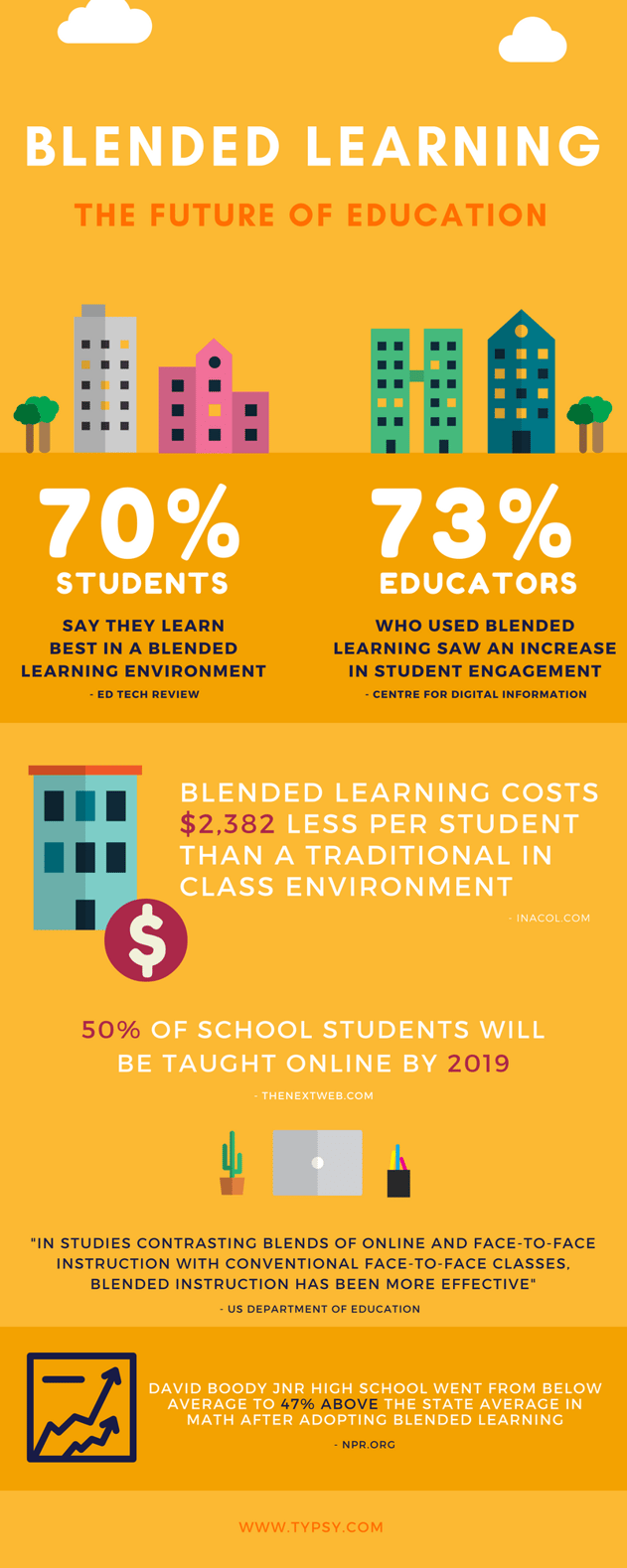If you walk into David A. Boody Junior High School in Brooklyn, New York, you’ll notice each classroom is around the size of a basketball court – and all 100 students are plugged into a laptop. The room is divided into 10 sections and there are 15 teachers and teaching aids available for one-on-one support.
When the sixth graders get to class, they either log onto their laptop or check a monitor at the front of the room to find out where they are to sit for the day. This is delivered by an algorithm that monitors the students’ daily performance.
Once they are seated, they start work independently. The computer tells them what kind of lesson they will do and briefly quizzes them at the end of each class. These results are then sent to the teachers, along with a teaching plan for the next lesson.
Could blended learning change student experiences for the better?
David A. Boody Junior High School may be at the forefront of blended learning, but they certainly aren’t alone. There are several schools worldwide experimenting with blended learning, and the results are staggering, as you can see in the below infographic.

One parent from Chicago Virtual Charter School, a blended-learning high school where students spend two days per week on campus and complete the rest of their course material online, explained, "My son became frustrated and angry with the school system beginning in first grade. He was bullied by many children and criticized and discouraged from further study by staff. I feel that we are in the right place now.”
 Another parent from Nexus Academy of Lansing, a flex-model blended-learning high school in Michigan, shared a similar view. “The reason we picked Nexus Academy was because [my son] was in a bad place and he needed his self-esteem to be boosted, and we couldn’t find it in a traditional school within our district. We have seen a tremendous change in his self-esteem and self-worth. His excitement about school has totally changed. He wants to be at school. He’s excited about it. He talks about it to his friends, the people he works with, everyone.”
Another parent from Nexus Academy of Lansing, a flex-model blended-learning high school in Michigan, shared a similar view. “The reason we picked Nexus Academy was because [my son] was in a bad place and he needed his self-esteem to be boosted, and we couldn’t find it in a traditional school within our district. We have seen a tremendous change in his self-esteem and self-worth. His excitement about school has totally changed. He wants to be at school. He’s excited about it. He talks about it to his friends, the people he works with, everyone.”
What does this have to do with hospitality education?
In five years, these high school students will be picking career streams and university degrees. And they won’t be thinking like we used to think.
For one, the hospitality industry is likely to see more students who confidently know they want a career in hospitality. This is because even high school classes are being rebuilt to better serve individual learners, allowing students to explore their passions and sooner discover what they like and don’t like.
We are also likely to see students with higher levels of confidence entering the industry because schools are providing students with more opportunities to work on their own projects at their own pace.
This is empowering a lot of students who otherwise struggled with the old school system where bullying and discouragement are rampant. This increase in confidence could make students more entrepreneurial from a younger age. So, whilst today most entrepreneurs are sculpted by time in the workforce, we may see more students coming straight out of school with ambitions to build their own businesses.
These students will become frustrated with classes and lecturers that don’t directly correspond to their ambitions. This could push universities to streamline their syllabuses and encourage universities to offer more specific and specialized degrees. Those educators who aren’t flexible enough to adapt their programs may even see a drop off in enrolments.
Making learning less black and white
Blended learning models could make hospitality education a lot less black and white.
Instead of saying, ‘today we’re learning in the classroom and tomorrow we’ll apply what we learnt in the field’, theoretical education is likely to be more integrated into practical lessons.
For instance, a larger amount of theory could be taught on the job, meaning hospitality students will get into the field sooner and spend less time in a traditional classroom setting.
We may also see less importance placed on the need for qualifications, and more independent educators starting up. Already, many experts in the industry are producing and publishing their own masterclasses. Today, these courses might not be legitimized by the tertiary sector, but that attitude could change as more and more key industry employers come to acknowledge the value of these lessons.
Finally, blended learning could entice more students to apply for university. According to the University of Central Florida’s Rosen College of Hospitality, “Many students faced with work and family obligations are attracted to the flexibility of blended courses, and fully or partially online courses may be an important factor in whether or not they can complete a program”.
All this said, if history has taught us anything it’s that the future is very difficult to predict. Sure, we could see many of these changes come into play in the next five years, but in 10 years I can only imagine that the hospitality education landscape will be unrecognizable.
What are your thoughts on blended learning in hospitality schools? If you're a student or a teacher who has had experience with this, let us know in the comments!
You might also like